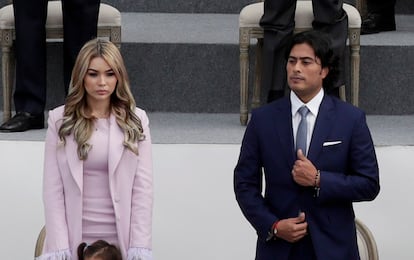Nicolás Petro and Daysuris Vásquez: The couple that rocked the Colombian government
The son of President Gustavo Petro and his ex-wife sought easy profit by taking advantage of their political and family relationships


This is the story of a family tragedy, in the style of a Shakespearean play or the TV show Succession. It could be seen as a Latin American soap opera about love, betrayal, money and power. But perhaps it is, above all, a snapshot of a society with very little upward mobility, where easy money and corruption are among the few ways to get ahead.
The lead character of this story is a couple who have since broken up. But according to Colombian prosecutors, when they were together, they acted as “middle-class careerists”: they led a life of luxury despite having a background and paycheck more typical of the middle class. As the prosecutor has revealed and the two have confessed, they were able to lead this lifestyle thanks to lies and corruption. These revelations have triggered a political scandal that has directly hit Colombian President Gustavo Petro directly, although he has distanced himself from the case.
The couple in question is Gustavo Petro’s oldest son, Nicolás Petro Burgos, and Daysuris Vásquez, his ex-wife. The two grew up on the Colombian Caribbean coast, a region known for its beaches and great economic inequality. Petro was raised by his mother and grandparents, in a wealthy family in the Caribbean department of Córdoba. He had little contact with his father, who was first imprisoned for being a member of the M-19 guerrilla group, and then in living in hiding. Vásquez grew up in a lower-middle-class family in the city of Barranquilla. She lived with her mother Liceth and sister Gleidys in the crowded neighborhood of Santo Domingo de Guzman.
As a law student, the young Vásquez had her first serious relationship, one with ties to politics and the ruling classes. She was the wife of Pedro Name Delgado, a man three decades older who worked in the office of Elsa Noguera, the former mayor of Barranquilla. Name was also the nephew of one of the most important political bosses in the city: José Name Terán. Vásquez became a contractor for the district, where Name was known, but life, with its ups and downs, led them to divorce. Then Vásquez met Nicolás Petro, who was also related to a politician. By that time, Nicolás Petro’s father had held office in Congress and been the mayor of Bogotá.
Vásquez and Nicolás Petro became a couple in 2016 and shortly after, according to Daysuris’s mother, Nicolás went to live with the family in the Santo Domingo de Guzmán neighborhood, in the southwest of Barranquilla. In 2019, they were married in a civil ceremony. With his father’s support, Nicolás began his campaign to be governor of the Atlántico department, which was headed by the powerful Char family, who was backing Noguera. He came a distant but honorable second place, and that secured him a seat, as well as the status and income of a departmental deputy. The couple had risen — directly and not through their partners or relatives — to power.
In April 2022, in the middle of Gustavo Petro’s presidential campaign, the two were married in a church. Less than four months later, on August 7, 2022, Vásquez was at Petro’s inauguration as president. But just months later, Vásquez’s separated from Nicolás, who had begun dating her best friend. A wounded Vásquez told Gustavo Petro and then Colombian magazine Semana the information that would lead to the sweeping scandal. According to Vásquez, Nicolás Petro told her on March 2 that he had collected hundreds of millions of pesos (tens of thousands of dollars) during the campaign, claiming that it was for electoral expenses. But this money had been appropriated to maintain their lifestyle of luxuries and privileges.
Since then, it’s been proven that these revelations were true, albeit half true. The Prosecutor’s Office arrested the two on Saturday, July 29, and the following week, presented evidence to convince a judge that they needed to remain in pre-trial detention. Nicolás, who initially denied everything, decided to collaborate with the Prosecutor’s Office. After changing lawyers, he announced that he wanted to be a present father for the child he is expecting. He admitted to what Vásquez had revealed and presented evidence to demonstrate that part of the money had indeed gone to the campaign, which would make his actions an irregularity and perhaps a crime.
That revelation, on Thursday, August 3, has marked Colombia ever since, and the focus has shifted to the president, his campaign manager and close ally, and the donors revealed by Vásquez. Nicolás Petro has said that his father was not aware of the two most scandalous campaign donors, a former drug trafficker and the son of a contractor on trial for possible links with paramilitary groups. Beyond the nuances, it was made clear that the temptation to abuse of power and make quick money did not begin with Gustavo Petro’s presidential campaign or with Petro himself.
At the same August 3 hearing, the Prosecutor’s Office revealed that the first irregularities occurred in mid-2021, when the couple allegedly benefited from contracts for the care of the elderly signed by the Social Consciousness Foundation and the Atlántico departmental government, which is led by Elsa Noguera. At the hearing, prosecutors also presented a recording from December 2021, in which Vásquez is heard saying that she was going to meet with the governor to “organize” the renewal of the project in 2022.
There is no known proof that this meeting took place, but there is evidence that Vásquez and the director of the Social Consciousness Foundation — former Barranquilla councilor Gustavo de la Ossa — were in constant contact. The Prosecutor’s Office has revealed several communications between the two that were allegedly aimed at fixing the contracts. In a message from August 2021, Vásquez explains how to distribute part of the money: 120 million pesos for her (about $28,000) and 40 million pesos (about $9,500) for him and another partner. According to the Prosecutor’s Office, the person who acted as the messenger was none other than Pedro Name, Vásquez’s first husband. De la Ossa said that he barely knew Nicolás Petro. Everything indicates that the network was organized by Vásquez.
But when during Gustavo Petro’s presidential campaign, Nicolás Petro admits that he was directly involved with the scheme. Getting rich was a joint project. The Prosecutor’s Office has charged the two with the crime of money laundering, pointing out how the couple tried to conceal their rapidly rising fortune. For example, according to evidence, Vásquez put a Mercedes-Benz in the name of her uncle César Emilio Vásquez, after ruling out her sister Gleidys because she was a police officer and part of the presidential escort. “They are going to fuck her over,” Nicolás Petro warned Vásquez, seeking to protect his then sister-in-law and maintain the facade.
The scandal continues. Vásquez and Petro were released from prison after agreeing to collaborate with the Prosecutor’s Office. They have committed to providing evidence on the corruption scheme that they built, both within the circles of contractors and politicians of Barranquilla, which has been dominated by the powerful Char family for the past 15 years, and around the presidential campaign of Petro, who is an outspoken critic of the Char family. Two opposite sides in ideology and politics that have both been hit by the corruption and the desire for wealth of a couple that is no longer.
Sign up for our weekly newsletter to get more English-language news coverage from EL PAÍS USA Edition
Tu suscripción se está usando en otro dispositivo
¿Quieres añadir otro usuario a tu suscripción?
Si continúas leyendo en este dispositivo, no se podrá leer en el otro.
FlechaTu suscripción se está usando en otro dispositivo y solo puedes acceder a EL PAÍS desde un dispositivo a la vez.
Si quieres compartir tu cuenta, cambia tu suscripción a la modalidad Premium, así podrás añadir otro usuario. Cada uno accederá con su propia cuenta de email, lo que os permitirá personalizar vuestra experiencia en EL PAÍS.
¿Tienes una suscripción de empresa? Accede aquí para contratar más cuentas.
En el caso de no saber quién está usando tu cuenta, te recomendamos cambiar tu contraseña aquí.
Si decides continuar compartiendo tu cuenta, este mensaje se mostrará en tu dispositivo y en el de la otra persona que está usando tu cuenta de forma indefinida, afectando a tu experiencia de lectura. Puedes consultar aquí los términos y condiciones de la suscripción digital.








































